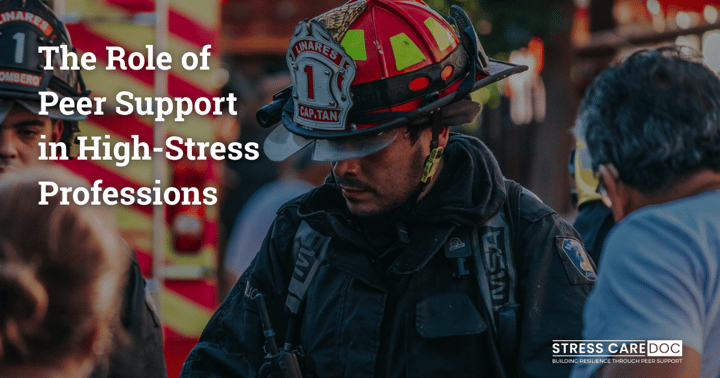Overcoming Burnout: Rekindle Your Passion and Enjoy Your Work Again

Are you just going through the motions at work and at home, without really enjoying what you’re doing anymore? Does work feel like a daily slog, where you do the same things and go through the day on autopilot? If this sounds familiar, you might be experiencing burnout. In this post, we’ll explore the warning signs of burnout and offer five practical steps you can start taking today to get the fire back.
What is Burnout?
Burnout is a state of complete mental, physical, and emotional exhaustion. According to a 2019 survey by the Journal of Emergency Medical Services, over 60% of first responders reported feelings of burnout. As a first responder, you often face situations most people can't imagine. The mental, emotional, and physical burden of the job can leave you feeling empty and drain the life out of you.
Imagine your energy and motivation as a battery. Burnout is when that battery isn't just low; it’s completely drained. You’re under constant stress, juggling too many things at once without enough downtime to recover. Let’s look at some of the danger signs of burnout and how to recognize them.
Danger Signs of Burnout
-
Constant Fatigue
Constant fatigue means you’re always tired, no matter how much sleep you get or how much you try to relax. Even after a full night's sleep or weekend naps, you wake up feeling like you’ve pulled an all-nighter. This deep, persistent tiredness doesn’t go away with rest and affects you physically, emotionally, and mentally.
-
Detachment
Detachment, or depersonalization, makes you feel like you’re on the outside looking in, both at work and in your personal life. As burnout sets in, you might feel numb and disconnected from the people you’re supposed to help. This feeling can extend to your coworkers and even your family, making you feel isolated and alone.
-
Increased Irritability
Increased irritability means you have a shorter temper than usual and get frustrated with tasks that used to be manageable. You might lose your cool over minor things and become less tolerant of your coworkers or the people you’re supposed to help. This irritability is a sign that something isn’t right and needs to be addressed.
-
Reduced Performance
Reduced performance is a consistent drop in the quality of your work and your ability to make decisions. You might hesitate over decisions you once made confidently or overlook details in your reports. This decline in performance can be hard to admit, but it’s an important step toward addressing burnout.
-
Physical Symptoms
Burnout can cause physical symptoms like headaches, stomach issues, and muscle tension. These symptoms are your body's way of sounding the alarm that something is wrong. Ignoring these signs can lead to even more serious health problems.
Recovering from Burnout
Recovering from burnout is like fixing a flat tire. You can’t get anywhere until you address the problem. Here are five practical things you can start doing today to help you bounce back from burnout:
-
Balance Activity with Relaxation
Mix physical activity with relaxation techniques to combat burnout. Challenge yourself to engage in activities that relax you, like meditation, guided imagery, or yoga. Aim to rack up at least 30 points a week by doing a combination of exercises for 30 minutes or longer and relaxing activities.
-
Eat Well to Feel Well
Nutrition is a cornerstone of combating burnout. Eat wholesome meals with veggies, lean proteins, and whole grains to fuel your body and mind. Treat yourself like a top-tier athlete because, in many ways, that’s what you are.
-
Do Something You Love
Set aside time every week to do something purely for your enjoyment. Whether it’s reading a book, going fishing, or playing the guitar, make sure you do activities that recharge you. It’s like putting on your oxygen mask first so you can help others.
-
Create Your Own Sanctuary
Have a personal retreat spot where you can relax or be by yourself. It could be a cozy corner with your favorite chair or a spot in your backyard. Make it your stress-free zone.
-
Master Your Time
Feeling overwhelmed often comes from feeling like there aren’t enough hours in the day. Use time management techniques to plan your week, set specific goals for each day, and keep track of tasks. This can be a game-changer in managing stress.
Professional Help
Getting professional help can play a pivotal role in recovering from burnout. If your agency has an employee assistance program, use it. These professionals can help you understand what’s going on and give you tools and strategies to deal with burnout. It’s okay to ask for help, and it’s really brave to do so.
Organizational Support
Organizational support can also make a big difference. Go through the proper channels to make necessary changes if possible. This could mean making a lateral move or moving to a different division.
Keeping Burnout at Bay
The same things that help you recover from burnout can also help prevent it. Connect with your peers or friends who understand the grind and spend quality time with them. Make sure you get enough sleep, aiming for seven to eight hours whenever possible. Sleep is when your brain detoxes and your body heals.
Final Thoughts
Burnout is a serious issue, but it doesn’t have to dictate your career. By recognizing the danger signs and taking practical steps to address them, you can reignite your passion for your work and enjoy your life again. Remember, it’s okay to ask for help and take steps to prioritize your well-being. You deserve to thrive, not just survive.
Listen to the episode here.





